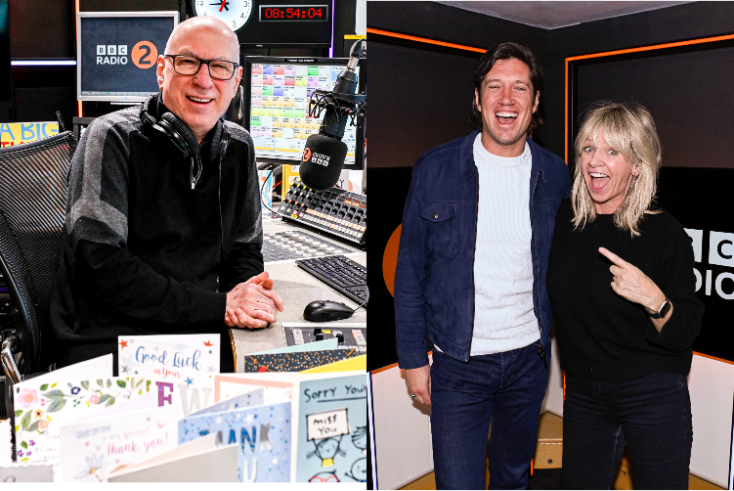Have TV light entertainment presenters killed the radio star?

Opinion
The recent changing of the guard among radio hosts doesn’t bode well for show quality.
With last Autumn’s departure of BBC2’s Steve Wright, the upcoming exit of the station’s evergreen Ken Bruce and Steve Allen out at LBC, there’s been a changing of the guard in radio’s ranks of elder statesmen.
As has ever been the case, but the news highlighted the BBC’s policy of placing TV light entertainment presenters (such as Rylan Clark and Graham Norton — before he upped sticks to Virgin Radio) into radio roles, whether they are suitable or not.
Hence the replacement of septuagenarian Ken Bruce, who claimed that he had effectively been forced out by BBC bosses by comparatively youthful 48 year-old Vernon Kay, gameshow presenter and Tess ‘Strictly’ Daly’s sometimes errant husband.
I will be presenting my last show on Radio 2 next Friday. I had intended fulfilling my contract until the end of March but the BBC has decided it wants me to leave earlier. Let’s enjoy the week ahead!
— Ken Bruce (@RealKenBruce) February 24, 2023
Kay, who after his transgressions of 2010 has some form in the art of dissembling, characteristically overdid his faux-humble act, turning on the waterworks (presumably he had access to a large peeled onion) to declare: “One of the best things that has happened in the past few days is every single person on Radio 2 has messaged me and sent me an amazing either a voicemail, email, a WhatsApp… just saying how overjoyed that I’m joining the family… I’m getting quite emotional.”
The sincerity just shines through, doesn’t it?
Radio producer Dan Cocker opted to play the role of Corporation myrmidon and defended BBC management in their somewhat brutal dispatch of the much-loved Bruce, tweeting:
Ken has not been “shafted by Radio 2”. A rival network with deep pockets approached Ken and made him a lucrative offer. After 30 years, Ken made probably a difficult decision to leave R2 and to join Greatest Hits. Good for him.
— Dan Cocker (@cockertron) February 26, 2023
Further down the thread Cocker added: “R2 recognise Ken is now a GH brand, and every extra moment he’s in a BBC studio is free advertising for his new gig.”
“It’s an unworkable position for Radio 2. They have no choice but to let him go sooner rather than later. They’ve also been generous: ANY commercial network would have let him go immediately after announcing his intended departure. Giving him a week to say goodbye is generous.”
The wrong stuff
At least Steve Wright was supplanted by another DJ (Scott Mills), rather than some random TV performer under contract to the BBC for x numbers of hours a year.
In the case of LBC’s Steve Allen, there was widespread lamentation at the news of his sudden departure after 44 years at the station, although some commentators expressed satisfaction at his abrupt exit.
Former Jack FM host Iain Lee was still fuming over Allen’s controversial ‘fat-shaming’ of Gordon Ramsay’s 21-year-old daughter (describing her as a “chubby little thing”) when she was on Strictly Come Dancing in 2021.
You’ll see a lot of tributes to Steve Allen. A lot of them coming from older white men.
None of them will address this fat shaming incident or any of the 100’s of other.
Before you praise him, read this and imagine he’s talking about your daughter. https://t.co/XCBUkOrmmL
— Iain Lee (@iainlee) February 24, 2023
Just about ready for the knacker’s yard
Back at BBC Radio, 2022 saw a farewell to old lags Paul O’Grady, Vanessa Feltz and Craig Charles; no great loss, I hear you say, but the likes of former Ladette duo Zoe Ball and Sara Cox, younger sister Fearne Cotton and overexposed TV presenters Romesh Ranganathan, Dermot O’Leary, Claudia Winkleman aren’t much to write home about either.
Yes, El Tel (Wogan), Kenny Everett and further back, Pete Murray and David Jacobs all dallied with TV — and were very successful in the medium — but radio was always their first love, and one they all returned to.
Witness Terry Wogan’s masterclasses in cheeky stories, such as ‘Janet & John – At The Baker’s Shop’.
And by the way, why are the BBC so unnecessarily churlish when on-air talent leaves the Corporation?
Witness the harsh treatment of Bruce, Emily Maitlis and the humiliating audition offers to senior newsreaders for the merged BBC News Channel.
All the while clinging onto charmless and shifty chairman Richard ‘Dick’ Sharp.
Sharp, if you remember, said the by now departed Maitlis was, “completely wrong” in suggesting “due process wasn’t followed” in the Corporation’s handling of her Newsnight intro on Dominic Cummings’ Barnard Castle eye test excursion.
BBC ultra-loyalist Laura Kuenssberg joined in the Maitlis pile-on, proclaiming (without having the backbone to name her target), “I’ve never been told what to say — or what not to say, maybe more importantly.”
Improving measurement voted top priority to boost audio on media plans
I left Auntie for the second time when then-incoming director-general and diminutive professional cockney Greg Dyke said: “Please don’t stay at the BBC and moan. It damages the morale of the BBC internally and the reputation of the BBC outside. If you genuinely don’t like the BBC or don’t think you’ll like what it’s going to be, please take control of your own life and go somewhere else.”
His arrogantly chippy attitude helped me make up my mind to jump ship.
When, years later, he irrationally refused to get out of my way when I politely asked him to let me pass through a door at a TV industry bash, I knew I had made the correct choice.
Well…kind of.
With some of the surlier/weirder characters at ITV (e.g., Michael Green) it was occasionally a case of out of the frying pan…
Why did they ask Evans?
And finally, Chris Evans, the ultimate radio-turned-TV star, the Simon Dee of the 90s/00s, if you will.
I admit to enjoying his GLR shows in the early 1990s, but soon soured on the DJ as his popularity (and ego) grew.
Having worked with Matthew Bannister (former BBC Radio 1 controller) when he was in charge of BBC Productions, I had a fair idea of Evans’ character. Fortunately, I was never in the position of those Big Breakfast grunts subjected to the fellow’s peculiar fondness for flashing his junk.
So, the news that, in answer to a question by a remaining fan about a return to the small screen was: “No can do. Family time is everything to me. Radio in the morning is my limit”, can be greeted with relief by those not enamoured by his boorish antics.
But, knowing Evan’s mercurial nature, I wouldn’t bet on him not attempting one last TV hurrah to expunge the failure of his ghastly one-season stint at Top Gear (2016).
 Stephen Arnell began his career at the BBC, moving to ITV where he launched and managed digital channels. He continues to consult for streamers and broadcasters on editorial strategy. He currently writes for The Spectator, The Independent, and The Guardian on film, TV and cultural issues. He is also a writer/producer (including Bob Fosse: It’s Showtime for Sky Arts) and novelist.
Stephen Arnell began his career at the BBC, moving to ITV where he launched and managed digital channels. He continues to consult for streamers and broadcasters on editorial strategy. He currently writes for The Spectator, The Independent, and The Guardian on film, TV and cultural issues. He is also a writer/producer (including Bob Fosse: It’s Showtime for Sky Arts) and novelist.




